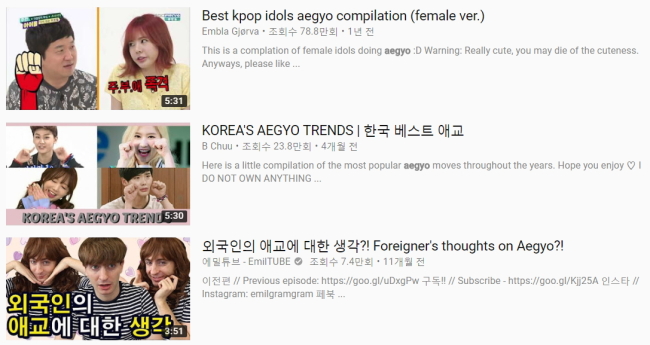'Aegyo,' 'maknae': How Korean words make up the unique vocabulary of K-pop fans
전체 맥락을 이해하기 위해서는 본문 보기를 권장합니다.
Content relating to the terms abounds online. YouTube overflows with compilations of "best K-pop idols' aegyo" scenes. YouTuber Kennie J. D., who posts videos about Korean language and culture, devoted a video to how ambiguous and difficult it is to use the term "oppa" from a foreigner's perspective. Fans frequently refer to the youngest members of K-pop groups as "maknae," the Korean word for "youngest sibling."
In August, a romantic comedy series bearing a Korean phrase in its title kicked off in the Philippines. The series is called "My Korean Jagiya" –- "jagiya" being a Korean term used for a lover, similar to "babe" or "honey."
이 글자크기로 변경됩니다.
(예시) 가장 빠른 뉴스가 있고 다양한 정보, 쌍방향 소통이 숨쉬는 다음뉴스를 만나보세요. 다음뉴스는 국내외 주요이슈와 실시간 속보, 문화생활 및 다양한 분야의 뉴스를 입체적으로 전달하고 있습니다.
Using Korean words has risen as a trend among K-pop and K-drama fans worldwide.
Certain words and slang that recur frequently in Korean popular culture are being incorporated into the everyday language of fans.
Such words include “oppa,” the term females use to affectionately call older males, and “aegyo,” which refers to a display of cuteness. Korean words are sometimes altered for an English-friendly spelling and pronunciation. “Kyeopta” (originally pronounced “gwiyeopda”) means “that’s cute,” and “bogoshipo” (“bogosipeo”) means “I miss you.”
The words are often reflections of a specific facet of Korean culture that cannot be easily translated into English.

Content relating to the terms abounds online. YouTube overflows with compilations of “best K-pop idols’ aegyo” scenes. YouTuber Kennie J. D., who posts videos about Korean language and culture, devoted a video to how ambiguous and difficult it is to use the term “oppa” from a foreigner’s perspective. Fans frequently refer to the youngest members of K-pop groups as “maknae,” the Korean word for “youngest sibling.”
In August, a romantic comedy series bearing a Korean phrase in its title kicked off in the Philippines. The series is called “My Korean Jagiya” –- “jagiya” being a Korean term used for a lover, similar to “babe” or “honey.”
The heroine Gia, played by Heart Evangelista, is a bubbly Korean drama fan who unknowingly meets her longtime crush, the former Korean superstar Kim Jun-ho, played by Alexander Lee.
Last February, Fandom Media, a collective of writers who write about various aspects of Korean pop culture, published a book called “K-pop Dictionary: 400 Essential K-pop & K-drama Vocabulary & Examples Every Fan Must Know,” which is available on Amazon.
The book, penned by Korean-American Kang Woo-sung, includes everything from everyday words such as “chingu” (friend) and “jinjja” (really) to contemporary slangs such as “hul” and “daebak,” utterances used to indicate surprise, shock or joy, and “aigoo,” used when someone is in pain or disbelief.
It also features obscure K-pop fandom slang, such as “sasaeng,” which refers to over-the-top, obsessive fans who track down the homes and private lives of their favorite stars.
By Rumy Doo (doo@heraldcorp.com)
<ⓒKoreaHerald(www.koreaherald.com)무단전재 및 재배포 금지>
Copyright © 코리아헤럴드. 무단전재 및 재배포 금지.